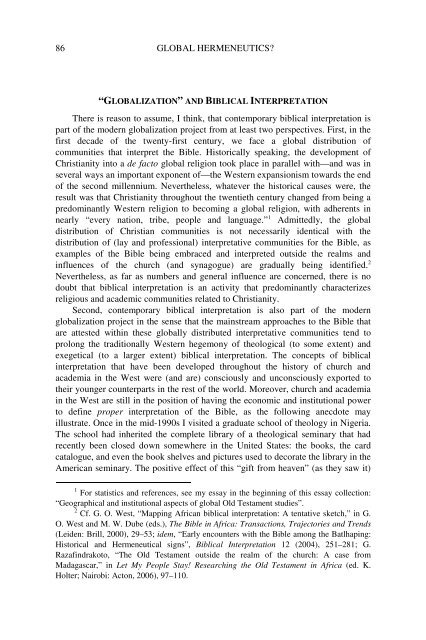Global Hermeneutics? - International Voices in Biblical Studies ...
Global Hermeneutics? - International Voices in Biblical Studies ...
Global Hermeneutics? - International Voices in Biblical Studies ...
Create successful ePaper yourself
Turn your PDF publications into a flip-book with our unique Google optimized e-Paper software.
86 GLOBAL HERMENEUTICS?<br />
“GLOBALIZATION” AND BIBLICAL INTERPRETATION<br />
There is reason to assume, I th<strong>in</strong>k, that contemporary biblical <strong>in</strong>terpretation is<br />
part of the modern globalization project from at least two perspectives. First, <strong>in</strong> the<br />
first decade of the twenty-first century, we face a global distribution of<br />
communities that <strong>in</strong>terpret the Bible. Historically speak<strong>in</strong>g, the development of<br />
Christianity <strong>in</strong>to a de facto global religion took place <strong>in</strong> parallel with—and was <strong>in</strong><br />
several ways an important exponent of—the Western expansionism towards the end<br />
of the second millennium. Nevertheless, whatever the historical causes were, the<br />
result was that Christianity throughout the twentieth century changed from be<strong>in</strong>g a<br />
predom<strong>in</strong>antly Western religion to becom<strong>in</strong>g a global religion, with adherents <strong>in</strong><br />
nearly “every nation, tribe, people and language.” 1 Admittedly, the global<br />
distribution of Christian communities is not necessarily identical with the<br />
distribution of (lay and professional) <strong>in</strong>terpretative communities for the Bible, as<br />
examples of the Bible be<strong>in</strong>g embraced and <strong>in</strong>terpreted outside the realms and<br />
<strong>in</strong>fluences of the church (and synagogue) are gradually be<strong>in</strong>g identified. 2<br />
Nevertheless, as far as numbers and general <strong>in</strong>fluence are concerned, there is no<br />
doubt that biblical <strong>in</strong>terpretation is an activity that predom<strong>in</strong>antly characterizes<br />
religious and academic communities related to Christianity.<br />
Second, contemporary biblical <strong>in</strong>terpretation is also part of the modern<br />
globalization project <strong>in</strong> the sense that the ma<strong>in</strong>stream approaches to the Bible that<br />
are attested with<strong>in</strong> these globally distributed <strong>in</strong>terpretative communities tend to<br />
prolong the traditionally Western hegemony of theological (to some extent) and<br />
exegetical (to a larger extent) biblical <strong>in</strong>terpretation. The concepts of biblical<br />
<strong>in</strong>terpretation that have been developed throughout the history of church and<br />
academia <strong>in</strong> the West were (and are) consciously and unconsciously exported to<br />
their younger counterparts <strong>in</strong> the rest of the world. Moreover, church and academia<br />
<strong>in</strong> the West are still <strong>in</strong> the position of hav<strong>in</strong>g the economic and <strong>in</strong>stitutional power<br />
to def<strong>in</strong>e proper <strong>in</strong>terpretation of the Bible, as the follow<strong>in</strong>g anecdote may<br />
illustrate. Once <strong>in</strong> the mid-1990s I visited a graduate school of theology <strong>in</strong> Nigeria.<br />
The school had <strong>in</strong>herited the complete library of a theological sem<strong>in</strong>ary that had<br />
recently been closed down somewhere <strong>in</strong> the United States: the books, the card<br />
catalogue, and even the book shelves and pictures used to decorate the library <strong>in</strong> the<br />
American sem<strong>in</strong>ary. The positive effect of this “gift from heaven” (as they saw it)<br />
1 For statistics and references, see my essay <strong>in</strong> the beg<strong>in</strong>n<strong>in</strong>g of this essay collection:<br />
“Geographical and <strong>in</strong>stitutional aspects of global Old Testament studies”.<br />
2 Cf. G. O. West, “Mapp<strong>in</strong>g African biblical <strong>in</strong>terpretation: A tentative sketch,” <strong>in</strong> G.<br />
O. West and M. W. Dube (eds.), The Bible <strong>in</strong> Africa: Transactions, Trajectories and Trends<br />
(Leiden: Brill, 2000), 29–53; idem, “Early encounters with the Bible among the Batlhap<strong>in</strong>g:<br />
Historical and Hermeneutical signs”, <strong>Biblical</strong> Interpretation 12 (2004), 251–281; G.<br />
Razaf<strong>in</strong>drakoto, “The Old Testament outside the realm of the church: A case from<br />
Madagascar,” <strong>in</strong> Let My People Stay! Research<strong>in</strong>g the Old Testament <strong>in</strong> Africa (ed. K.<br />
Holter; Nairobi: Acton, 2006), 97–110.




